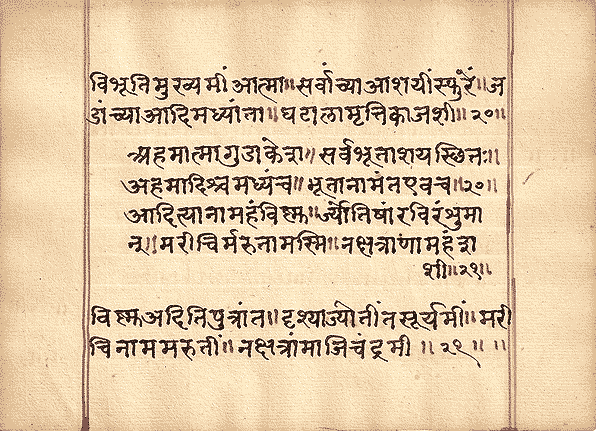BhG 10.20
aham ātmā guḍākeśa sarva-bhūtāśaya-sthitaḥ
aham ādiś ca madhyaṃ ca bhūtānām anta eva ca
To play the media you will need to either update your browser to a recent version or update your Flash plugin.
syntax
he guḍākeśa (O Guḍākeśa!),
aham (I) sarva-bhūtāśaya-sthitaḥ (situated in the hearts of all beings) ātmā (self) [asmi] (I am),
aham eva (certainly I) bhūtānām (of beings) ādiḥ ca madhyam ca antaḥ ca (and the beginning, and the middle, and the end) [asmi] (I am).
grammar
| aham | – | asmat sn. 1n.1 – I; |
| ātmā | – | ātman 1n.1 m. – self; |
| guḍākeśa | – | guḍākeśa 8n.1 m. – O one with thick hair (from: guḍa – ball, molasses; keśa – włosy); or TP: guḍākāyā īśeti – O lord of laziness (from: guḍākā – laziness, idleness, sleep; √xīś – to own, to reign, īśa – ruler, lord); |
| sarva-bhūtāśaya-sthitaḥ | – | sarva-bhūta-āśaya-sthitaḥ 1n.1 m.; TP: sarvāṇāṁ bhūtānām āśaye sthita iti – situated in the hearts of all beings (from: sarva – all, whole; √bhū – to be, PP bhūta – been, real, world; ā-√śī – to lie, to rest, āśaya – resting place, abode, seat, heart, mind; √sthā – to stand, PP sthita – standing, situated); |
| aham | – | asmat sn. 1n.1 – I; |
| ādiḥ | – | ādi 1n.1 m. – beginning, origin; |
| ca | – | av. – and; |
| madhyam | – | madhya 1n.1 n. – middle; |
| ca | – | av. – and; |
| bhūtānām | – | bhūta 6n.3 m. – of creatures, of beings (from: √bhū – to be, PP bhūta – been, real, world); |
| antaḥ | – | anta 1n.1 m. – end, limit, settlement, inside, nature; |
| eva | – | av. – certainly, just, merely; |
| ca | – | av. – and; |
textual variants
sarva-bhūtāśaya-sthitaḥ → sarva-bhūtāśaye sthitaḥ / sarva-bhūtāśayaḥ sthitaḥ (situated in the hearts of all beings / having resting place in all beings, standing);
ādiś ca → ādyaś ca (and the first);
madhyaṁ ca → madhyaś ca (and the middle);
Śāṃkara
tatra prathamam eva tāvat sṛṇu—
aham ātmā pratyag-ātmā guḍākeśa, guḍākā nidrā tasyāḥ īśo guḍākeśaḥ, jita-nidra ity arthaḥ | ghana-keśeti vā | sarva-bhūtāśaya-sthitaḥ sarveṣāṃ bhūtānām āśaye’ntar-hṛdi sthito’ham ātmā pratyag-ātmā nityaṃ dhyeyaḥ | tad-aśaktena cottareṣu bhāveṣu cintyo’ham | yasmād aham eva ādir bhūtānāṃ kāraṇaṃ tathā madhyaṃ ca sthitir antaḥ pralayaś ca
Rāmānuja
tatra sarvabhūtānāṃ pravartanarūpaṃ niyamanam ātmatayāvasthāyetīmam artham, yogaśabdanirdiṣṭaṃ sarvasya sraṣṭṛtvaṃ pālayitṛtvaṃ saṃhartṛtvaṃ ceti suspaṣṭam āha
sarveṣāṃ bhūtānāṃ mama śarīrabhūtānām āśaye hṛdaye aham ātmatayāvasthitaḥ / ātmā hi nāma śarīrasya sarvātmanā ādhāraḥ, niyantā, śeṣī ca / tathā vakṣyate, „sarvasya cāhaṃ hṛdi sanniviṣṭo mattas smṛtir jñānam apohanaṃ ca”, „īśvaras sarvabhūtānāṃ hṛddeśe ‚rjuna tiṣṭhati / bhrāmayan sarvabhūtāni yantrārūḍhāni māyayā // BhGR_1.” iti / śrūyate ca, „yaḥ sarveṣu bhūteṣu tiṣṭhan sarvebhyo bhūtebhyo ‚ntaro yaṃ sarvāṇi bhūtāni na viduḥ, yasya sarvāṇi bhūtāni śarīraṃ yas sarvāṇi bhūtāny antaro yamayati, eṣa ta ātmāntaryāmy amṛtaḥ” iti, „ya ātmani tiṣṭhan ātmano ‚ntaro yam ātmā na veda yasyātmā śarīraṃ ya ātmānam antaro yamayati, sa ta ātmāntaryāmy amṛtaḥ” iti ca / evaṃ sarvabhūtānām ātmatayāvasthito ‚haṃ teṣām ādir madhyaṃ cāntaś ca teṣām utpattisthitipralayahetur ityarthaḥ
Śrīdhara
tatra prathamam aiśvaraṃ rūpaṃ kathayati he guḍākeśa ! sarveṣāṃ bhūtānām āśayeṣv antaḥkaraṇeṣu sarvajñatvādi-guṇair niyantṛtvenāvasthitaḥ paramātmāham | ādir janma | madhyaṃ sthitiḥ | antaḥ saṃhāraḥ | sarva-bhūtānāṃ janmādi-hetuś ca aham evety arthaḥ
Madhusūdana
tatra prathamaṃ tāvan mukhyaṃ cintanīyaṃ śṛṇu aham iti | sarva-bhūtānām āśaye hṛd-deśe ‚ntaryāmi-rūpeṇa pratyag-ātma-rūpeṇa ca sthita ātmā caitanyānanda-ghanas tvayāhaṃ vāsudeva eveti dhyeyaḥ | he guḍākeśa ! jitanidreti dhyāma-sāmarthyaṃ sūcayati | evaṃ dhyānāsāmarthye tu vakṣyamāṇāni dhyānāni kāryāṇi | tatrāpy ādau dhyeyam āha – aham evādiś cotpattir bhūtānāṃ prāṇināṃ cetanatvena loke vyavahriyamāṇānāṃ madhyaṃ ca sthitir antaś ca nāśaḥ sarva-cetana-vargāṇām utpatti-sthita-nāśa-rūpeṇa tat-kāraṇa-rūpeṇa cāham eva dhyeya ity arthaḥ
Viśvanātha
atra prathamaṃ mām evaikāṃśena sarva-vibhūti-kāraṇaṃ tvaṃ bhāvayety āha aham iti | ātmā prakṛty-antaryāmī mahat-sraṣṭā puruṣaḥ paramātmā | he guḍākeśa jita-nidra iti dhyāna-sāmarthyaṃ sūcayati ! sarva-bhūto yo vairājas tasyāśaye sthita iti samaṣṭi-virāḍ antaryāmī | tathā sarveṣāṃ bhūtānām āśaye sthita iti vyaṣṭi-virāḍ antaryāmī ca | bhūtānāṃ ādir janma madhyaṃ sthitir antaḥ saṃhāraḥ | tat-tad-dhetur aham ity arthaḥ
Baladeva
tatra tāvan mām eva tvaṃ mahat-sraṣṭādi-tri-rūpeṇa svāṃśena nikhila-vibhūti-hetuṃ vicintayety āśayenāha aham ātmeti | he guḍākeśeti vijita-nidrasya tad-vicintana-kṣamatvaṃ vyajyate | ātmā vibhūti-vijñānānando mahat-sraṣṭādi-tri-rūpaḥ paramātmāham asmac-chabdārthaḥ sarva-bhūtāśaya-sthitas tvayā vicintyaḥ | sarva-bhūtā pradhānādi-pṛthivy-anta-tattva-rūpā yā mūla-prakṛtis tasyā āśaye ‚ntaḥ-karaṇodaśaya-rūpeṇāham eva prakṛty-antaryāmī sthitaḥ | tathā sarva-bhūtaḥ sarva-jīvābhimānī yo vairājas tasyāśaye garbhodaśaya-rūpeṇāham eva samaṣṭi-virāḍ-antaryāmī sthitaḥ | sarveṣāṃ bhūtānām jīvānām āśaye kṣīroda-śaya-rūpeṇāham eva vyaṣṭi-virāḍ antaryāmī sthita iti tāni trīṇi rūpāṇi mad-vibhūtitvena tvayā vincintyānīty arthaḥ | subālopaniṣadi prakṛty-ādi-sarva-bhūtāntaryāmī sarva-śeṣī ca nārāyaṇaḥ paṭhyate | sātvata-tantre trayaḥ puruṣāvatārāḥ smṛtāḥ –
viṣṇos tu trīṇi rūpāṇi puruṣākhyāny atho viduḥ |
ekaṃ tu mahataḥ sraṣṭṛ dvitīyaṃ tantu-saṃsthitam |
tṛtīyaṃ sarva-bhūtasthaṃ tāni jñātvā vimucyate || iti |
te ca vāsudevasya kṛṣṇasyāvatārāḥ –
yaḥ kāraṇārṇava-jale bhajati sma yoga-
nidrām ity ādikā brahma-saṃhitā-padya-trayāt | (5.47)
bhūtānām ādir utpattir madhyaṃ pālanam antaś ca saṃhāras tat-tad-dhetur aham evokta-puruṣa-lakṣyas tvayā bhāvyaḥ
- Copyright © 2010-2013 Quo Vadis Vision. Wszelkie prawa zastrzeżone.
- |
- About the project
- Appendices
- Audio
- Forum
- Contact

